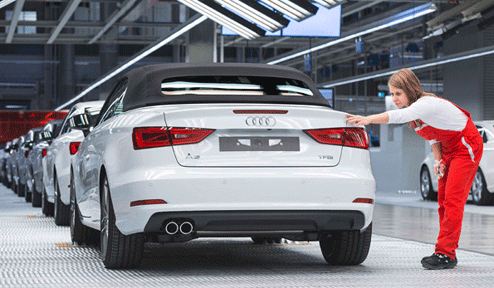 Ingolstad (Germany), Mar 23: German luxury auto brand Audi will begin selling its premium A3 Sedan in India from middle of the year and the much-awaited car will be rolled out from the company's production facility in Aurangabad.
Ingolstad (Germany), Mar 23: German luxury auto brand Audi will begin selling its premium A3 Sedan in India from middle of the year and the much-awaited car will be rolled out from the company's production facility in Aurangabad.
The brand with the four rings said it has decided to assemble A3 in India from the launch stage itself expecting that it will become a driver of growth for the company. India will be among very few countries where the luxury sedan will be produced locally.
The sale of A3 Sedan has started in only a few countries in Europe. It will be launched in the US next month.
Audi Group CEO Rupert Stadler said that India is a "strategically important market" for the company as the country has huge growth potential for luxury car segment.
Stadler said the company was struggling with depreciation of the currency in India and was looking forward to economic reforms, particularly in the taxation system by the new government after the parliamentary election.
In January, Audi India had reported 11 per cent growth in its 2013 sales at 10,002 units in India, thus becoming the first luxury car maker to cross the 10,000 milestone in the country. The company had sold 9,003 units in 2012.
Audi started local production in September 2007 with the Audi A6. It currently produces the Audi A4, Audi Q5, new Audi A6, Audi Q7 and Audi Q3 at its production facility in Aurangabad. Over 24,000 cars have been produced in Aurangabad in Maharashtra since the start of production in September 2007.
Asked about Audi's expansion plan for India, the CEO of the Audi Group, which has been one of the most successful car manufacturers in the premium and supercar segment, said the company would like to know the new government's policy initiatives on the economy.
"It depends on certain framework. First of all we would like to listen to the new political regime. We would like to see how the economy gets back to the next growth pattern," he said, expressing confidence about rolling out of certain reforms in the economy.
Stadler said he was looking for structural reforms in the India economy, including policy initiatives in the financial sector.
Member of the Board of Management of Audi Luca de Meo said the company has "decided to go for local production of A3 in India in the middle of the year because we see potential for it in the luxury car segment."
The Audi A3 is expected to compete with the Mercedes A-class and B-class and BMW's 1-series.
Audi India CEO Joe King said the company would like to bring every single luxury car to India but decisions in this regard will be taken based on consumer demand.
He said 92 per cent of the car deliveries by Audi in India last year were produced in the Aurangabad plant.
Audi group delivered over 1.5 million Audi brand cars in 2013 across the world.
The company has decided to invest between now and 2018 around 22 billion euro in innovations and new technologies as well as in expanding its worldwide manufacturing structures.





Comments
Add new comment